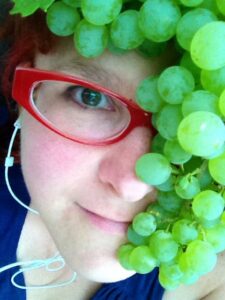The five-member teaching team for “Bread 101,” an interdisciplinary Clark Honors College class taught during the 2013-14 Academic Year, has won the 2015 Pedagogy Award from the national food studies organization, the Association for the Study of Food in Society. The committee cited the team’s innovative approach to teaching food.
The team was made up of University of Oregon faculty members Judith Eisen, neuroscientist; Miriam Deutsch, physicist; Eleanor Vandegrift, STEM (Science, Technology, Engineering, and Mathematics) educator; , literature Scholar and food writer; and Karen Guillemin, microbiologist. was the originator of the Center for the Study of Women in Society’s Food in the Field Research Interest Group, which helped pave the way for the UO Food Studies Program. She will be leading a conversation with bestselling Farm City author Novella Carpenter and teaching a writing workshop during the annual CSWS Northwest Women Writers Symposium May 7 - 9, 2015, this year aptly titled “Our Daily Bread: Women’s Stories of Food & Resilience.”
Dr. Burns Bright provided the following information about the award:
Description of the Award
The Association for the Study of Food and Society, founded in 1985, with the goals of promoting the interdisciplinary study of food and society, confers five annual awards for recognition of outstanding scholarship and teaching in the field of food within the social sciences, humanities and related disciplines. Submissions in the sciences, arts and other disciplines that deal with food are welcome if they discuss food as it relates to culture and society. The ASFS Award for Food Studies Pedagogy is given to the teacher of food studies in any discipline and at any level who presents a course that uses innovative and successful pedagogical techniques to reach students. http://www.food-culture.org/Description of the Course
HC 441: Science Colloquium “Bread 101” was team-taught by a group of scientists and a humanist in Spring 2014 at the University of Oregon Robert D. Clark Honors College. It was an ambitious, interdisciplinary, upper-division undergraduate honors science colloquium. We approached a simple loaf of bread as an object of inquiry in the sciences and humanities to improve students’ general science literacy. There were twenty honors students from different majors (with varying backgrounds in science).The course was team-taught by five instructors: Judith Eisen (Biology, Institute of Neuroscience, and Director of the Science Literacy Program), Elly Vandegrift (Biology and Associate Director of the SLP), Karen Guillemin (Biology and Director of the Microbial Ecology and Theory of Animals Center for Systems Biology), Miriam Deutsch (Physics and Oregon Center for Optics), and (Comparative Literature and English). The course was taught as an overload and the Clark Honors College provided a small stipend for instruction.
In the course, students explored:
- the chemistry, microbiology, and physics involved in transforming seed into bread;
- the genetics of wheat;
- the cultural and historical context of bread consumption;
- the politics of growing wheat and bread production in Eugene and in the U.S.
The course was unusual because of a curriculum that deployed humanities-based methods and assessments (essays on history and culture, weekly blog entries on readings from popular science periodicals and peer-reviewed journals) to augment science literacy (experiment design and homework on genetics, energetics, and microbiology) in a high-tech classroom with modular seating and individual white boards for group exercises.
As an experimental offering in the Clark Honors College, “Bread 101” also served as a course development laboratory for the Science Literacy Program (SLP), which seeks to improve general science literacy courses at the University of Oregon. It helped increase interest and offerings in the nascent UO Food Studies program. Two university publications produced features on the class, and a related exhibition helped publicize the course.
Most food studies classes are taught from a social science or nutrition perspective, with an occasional literature/history offering. We believe our course could serve as a model for other interdisciplinary courses that seek to cross the science/humanities divide, either using our theme (a food object as a line of inquiry) or our methodology.
Press
- Oregon Quarterly feature: http://www.oregonquarterly.com/bread-101 Around the O: http://around.uoregon.edu/content/clark-honors-college-course-bread-dough-did-rise


